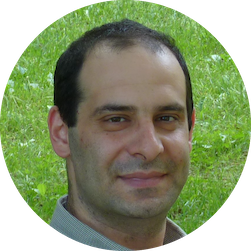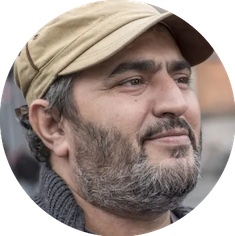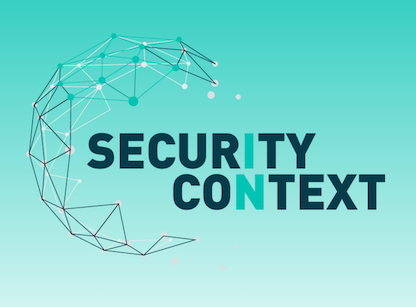Smear campaigns against Palestinian voices A conversation with Khaled Barakat
Anita Fuentes: Khaled, welcome and thanks for talking to us today. I’m Anita Fuentes, executive producer and host of the Security in Context podcast, and Omar Dahi, director of Securitying Context, is here with us today as well. I would like to start by asking you if you could introduce yourself to our audience and maybe tell us about your background and your work.
Khaled Barakat: Yes, my name is Khaled Barakat. I was born in Jerusalem in 1972, and I grew up in Jerusalem. I left Palestine at a very early age, when I was 12, to New York, and I have been a worker... I left school at a very early age, I was 10. And so I've been a worker for most of my life. And I spent about maybe twelve or fifteen years of my life in the US, and then in Canada, Europe, Lebanon, and mostly in the shatat, in diaspora. I'm a writer. I write regularly in the daily Lebanese newspaper Al-Akhbar, and a cultural magazine in Beirut Al-Adab. And I currently live in Vancouver, Canada.
Omar Dahi: Khaled, thanks again for joining us on short notice. This is Omar Dahi. I wanted to ask you about what seems to be a coordinated political campaign in Canada by multiple parties asking the government to expel you from the country. Can you explain a little bit more about the details and the background of this campaign? Who are the main groups or actors behind it? And what are some of their goals and narratives that they're putting forward?
Khaled Barakat: I think it's easy to spot who the forces behind this campaign are. It's the definitely the racist right-wing fascist groups in this country in alliance with the Israeli Embassy and zionist organizations who work as proxies for Israel, and some of them even for some security agencies. They said that publicly in their statements, that they've been gathering intelligence information, and they've been working directly with the Israeli security agencies, and they call themselves “human rights organizations.” I mean, it's really a joke. And, this campaign, the goal behind this campaign is to divert the attention of what's happening in Canada and what's happening in Palestine.
What's happening in Canada is that recently we have seen success in four major Canadian universities: Concordia, McGill, University of British Columbia, Simon Fraser University... These student governments and student societies have been voicing their position against Israeli crimes and Israeli colonization of Palestine, and they have been very clear about their support of Palestinian people’s rights of self-determination, freedom, and return. So Israel and the Zionist organizations here want to divert attention from the discussion on Palestine. They also don't want the public to get engaged in terms of what's happening in Palestine. We see that, on a daily basis, Israel is committing crimes against Palestinians everywhere, in Palestine from the river to the sea. Whether they are racist laws against our people in 1948 occupied Palestine inside Israel, or whether it’s the continuation of the siege on our people in Gaza, or their daily oppression of our people in Jerusalem and the West Bank. So Israel wants to shift the discussion from that to create fear. They know that fear is a very powerful tool that they can use by spreading fear, and say: “Hey, look, you have this guy who lives in Canada and he is an extremist leftist writer, and maybe you need to deport him.”
Now, this also reveals many facts about Canada and about the racism that goes on here. You know, I am a Canadian citizen, and so if I was like a white person with blue eyes they wouldn't say “deport him.” They'd say “prosecute him,” they'd say “you have to check his...” But they wouldn't say “deport him.” But it's very easy to say “deport that person,” and they base their allegations and their demand based on my case in Germany. My partner, Charlotte, and I were living in Berlin, and I was deported from Berlin because of my political activities, and because of my role in the organizing of the Palestinian community. And they even said that. I mean, the Germans have said that. And they clearly said: “You did not commit any crime in Germany. You didn't do anything against the law in Germany. But we don't like your ideas, and we don't like your thoughts, and we don't like the way you talk about Palestine and about Palestinians, and we think you're a threat to the relationship between the Arab community and the Jewish community in Germany.” But I am not a German citizen. I was working there, in a temporary residency. But we didn't accept that, of course. So there was a court in Berlin on March 11th, and they ruled that it was illegal to ban me from participating in a lecture I was invited to by three Arab community organizations to speak about Trump’s deal of the century. And, when we went to the event, we saw so many police cars and security presence, and they shut down the event and they said: “You can't speak in any public event in Germany.” I mean, these Arab organizations in Berlin were the Sudanese community, the Iraqi community, and the Syrian community. And that was a good thing because we're pushing for a unity of the community and our people to actually work together. And they don't want to see that. So, in short, these governments, like in Germany and Canada, are allies of Israel. You cannot distinguish between the official position of these governments and that of Israel. And they cannot tolerate us speaking our mind, and analyzing political affairs, and, you know, the Palestinian people’s struggle at this stage. They just want to portray us the way they do in Hollywood films, like a bunch of terrorist extremists. They just... No one should listen to them.
Anita Fuentes: So Khaled, the campaign against you is one of the many smear campaigns being launched against pro-Palestinian people and pro-Palestinian voices. What is your explanation for the timing of these campaigns? Why are they, or why do they seem to be increasing now?
Khaled Barakat: I think it's because of what happened last year. The unity of our people was demonstrated and materialized in almost an intifada. Israel also saw that Palestinians not just are able to unify themselves but to engage in all forms of struggle in one battle. We saw that the Palestinian resistance in Gaza ruled, and the Palestinian people inside Israel in 1948 occupied territories, Jerusalem and the shatat... Israel feared that, and, of course, these allegations, these smear campaigns have started before May of 2021. We know, for example, a very close friend of mine, Dr. Rabab Abdulhadi, someone I’ve known for 35 years. When I was a youth organizing Palestinian workers in New York, we were struggling together during the first Intifada. She's been under attack by Zionists, you know. And young Palestinian activists like Nerdeen Kiswani, a Palestinian student and activist in New York. She's been subjected to all kinds of smear campaigns. Including Jewish comrades and solidarity folks who have been attacked by Zionists in these smear campaigns.
I think it's, again, to divert the attention, to personalize it, to make it a problem of one individual, or a group of people, or one organization. And, I mean, we're not running away from the discussion when they say: “Oh, you support...” for example, “the PFLP.” Because, when they do that, when they say that, they're trying to criminalize us. Because there are organizations like Hamas, the PFLP, Hezbollah, which are on the so-called “terrorist list.” So they want to use this law to criminalize everyone. So, you know, if you organize a lecture to talk about Ghassan Kanafani, then you are a proxy of the PFLP. Because they don't want to know who Ghassan Kanafani is. They don't want to hear about Ghassan Kanafani’s novels and short stories, and his narratives, and what he represents for our people. So the easiest thing to do is just call them extreme leftists who are agents of the PFLP.
I don't know of any progressive community organization in North America that has not been called something like that in the last ten years. But, again, we want to fight these kinds of laws that criminalize Palestinian resistance. When they list Palestinian resistance groups on these so-called foreign terrorist entities, this is an attack on the Palestinian people, and it is an attack on Palestinian communities in North America. And that's why they want to separate our people from the resistance, so people won't say, you know, even the names of these organizations. And so they want to spread fear and to detach communities from the armed resistance. And I think they're failing because, people, when they are demonstrating, especially in the diaspora... I mean, that's all the chant. They say: “We're with the resistance. We're with the boycott of Israel. The unity of our people...” And so they're failing. I mean, they're failing big time. This is 2022. It's not the day after 9/11, when they were prosecuting and criminalizing our community left and right. There are organizations that dissolve themselves because of the fear that they have been subjected to. So I think we need to fight back, and it's important that we scrap that list that criminalized the resistance.
Now, it's a law, and we cannot break the law. But we don't have to like it. We don't have to agree with it. We don't have to be supporting it. We have our tools of organizing and say: “No. You cannot criminalize Palestinian resistance and Lebanese resistance.”
Omar Dahi: The laws that you were referring to, also legitimate Israeli actions. Because when you look at the situation in Palestine and the only thing you see is what the Palestinian resistance is doing and you condemn that, you're actually becoming a partner in the Israeli occupation and in the Israeli actions towards the Palestinians, because you're attacking one and, essentially, whitewashing the other, or legitimating the other. And I think that both sides of that are important to condemn. I agree with you completely. And I appreciate that you raised the issue of Germany as well, which is basically trying to criminalize the BDS campaign, and criminalizing, basically, dissent and pro-Palestinian voices, or harassing them, or trying to silence them in various ways. And this is even targeting German citizens. You are not a citizen there, but it's also targeting Germans there, so it's really disappointing to see the same things being used in Canada. But, as you said it's also coinciding with more education and awareness. And the fact that you see even mainstream human rights organizations, like Human Rights Watch, and Amnesty International, and so on, talking about Israeli apartheid and institutional racism, and so on.
I wanted to bring it back to one of the issues that you were targeted for, which is somewhat ironic, because one of the things you're being targeted for is your association with the Samidoun Palestinian Prisoners Network. Can you tell us a little bit more about the work of that network? Why does it exist and what does it try to do? What are some of its goals?
Khaled Barakat: Yes. Samidoun have been subjected to all forms of pressure and smear campaigns. In February 2021, [Benny] Gantz, the defense minister in Israel, designated Samidoun on the Israeli terrorist list. And they try to criminalize Samidoun. The reason they do that is because of Samidoun’s work on Palestinian prisoners. They don't want any organization outside Palestine, or even inside Palestine, to talk about the struggle of Palestinian political prisoners. They want to show a false image that these prisoners are just terrorists who are being locked in jail. So they don't want the world to know about who are these Palestinian prisoners. They’re students, and union leaders, and writers, and journalists, and, you know, Palestinian women who have been engaged in the struggle... You know, currently there is 4500 Palestinian political prisoners. Hundreds of them are being in administrative detention without trial or even the ability to defend themselves. And Israel is using administration detention in order to keep Palestinian activists the longest period possible without trial. And Samidoun exposes all of these crimes against Palestinian prisoners. And they don't want that. They also don't want anyone to translate the creative work and analysis and political positions of Palestinian leaders who are in prison, or writers such as Walid Dagga, a great Palestinian writer. Or someone like Ahmad Saadat, who would offer a great analysis about Palestine and the struggle of Palestine. They don't want to hear anything about Palestinian women prisoners and their stories. Because Samidoun exposes these crimes by the Israeli present authorities and translates that into ten, eleven, twelve languages. And so they want Samidoun gone. They don't like this network, that is an international network of activists. And lately they’ve tried to dissolve the collective of Palestine Vaincra in France. They are an integral part of the Samidoun network. And they also wanted to prosecute some of the members of Samidoun.
These campaigns actually, for some reason, have made Samidoun even stronger. More people are joining Samidoun. In the last year, I mean, they have doubled their numbers. I'm not sure if that's, you know... Like their work has been very effective, right? After they were designated. So it's not working. I mean, Israel is failing on that front.
Anita Fuentes: My last question for you is... Well, a large number of Canadian and international organizations have signed a petition in solidarity both with you and with Samidoun against the smear campaign that we were talking about. So the petition which was started by the Canada Palestine Association Vancouver has been endorsed by 49 organizations, I believe. So how can our listeners find out more information about your struggle? And, at a broader level, I was wondering if you could briefly comment on what is the most effective form of resistance to these kinds of attacks?
Khaled Barakat: I think that people could find out through Samidoun’s website, “samidoun.net”, and also Canada Palestine Association, an organization that was also engaged in defending Samidoun last year when Samidoun was attacked by Zionist organizations here in Canada. I think the number of organizations that signed the petition is probably over 60 or 65 organizations. This is important because it's actually bringing people together to fight back, because they know that it is not Samidoun or Khaled Barakat that is being targeted. It’s actually their work. They are the ones who are building the solidarity movement with Palestine. Unions, and students, activists, Palestinians, Arabs, and Jewish comrades and organizations who've been building the solidarity movement for years. So it's their fight, and it's our fight, and so this is important. I think it's important sometimes to differentiate between which battles we really should be engaged in, and how, and not to change our priorities. We want people to focus on building solidarity with Palestine, keep the boycott movement strong and alive, and accumulate more and more victories in unions and in churches, and universities. And we think that this is really the most important thing.
At the same time, to not give any kind of concessions or budge to these smear campaigns we need to have a clear political position on our support of Palestinian people’s right to decolonize Palestine from the river to the sea, to support Palestinian resistance with all forms of resistance. Palestinians are the ones who can determine which resistance and when they resist. They are the ones who are being massacred by the Israelis, so they have all the right to determine what form of resistance they choose. But for us in Canada, and the United States, and Europe, our role is to support our people. Support Palestinians for their struggle, and unify our movement. And not just the Palestinian movement, but the anti-imperialist movement in the belly of the beast. And it's really important to connect our struggles together. You know, the struggle for black liberation in the United States, the struggle for self-determination and sovereignty of indigenous people in Canada, the struggle against racism empowering refugees and immigrants... All of these struggles are connected, and they're important. They're all important.
Anita Fuentes: Khaled Barakat, thank you so much for speaking to us today. It was a pleasure to get to meet you, even if it was not in person, and I hope we can have you again in Security in Context or at Status Hour.
Khaled Barakat: Thank you so much for having me.












